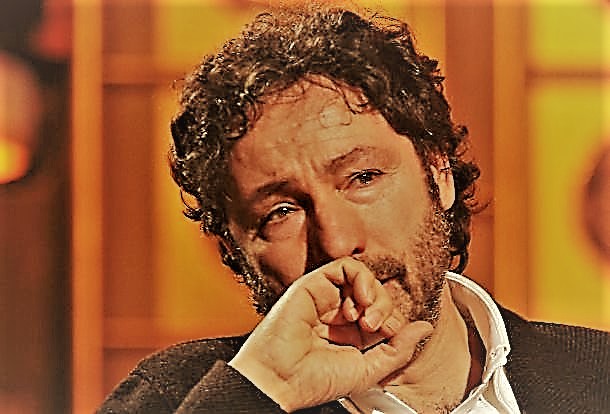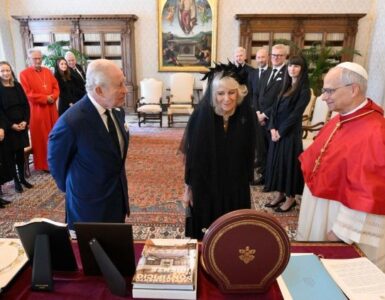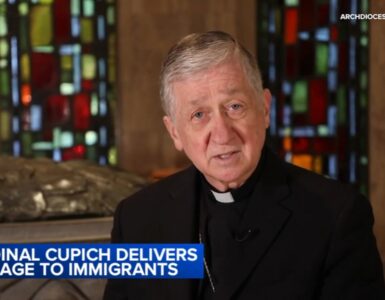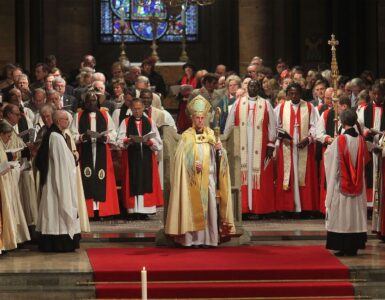This article appears in the current issue (Jan. 2019) of Catholic Family News (click HERE to subscribe; current subscribers can access the E-Edition HERE).
*****
“Holy Mother Church is facing a crisis that is without precedent in her entire history.” This image of the theologian Serafino M. Lanzetta, which opens the latest book of Antonio Socci, Il segreto di Benedetto XVI. Perché è ancora papa [The Secret of Benedict XVI: Why He Is Still Pope] (Milano 2018), invites anyone to read it who wishes to better understand the nature of this crisis as well as the possible ways out of it.
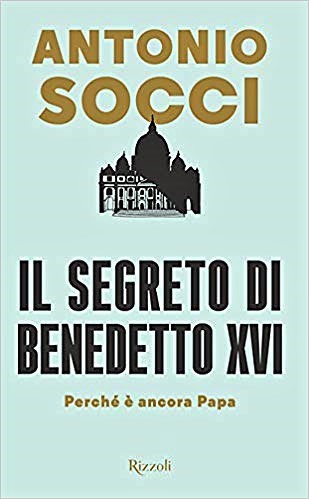
Socci is a brilliant journalist who has dedicated three books to the state of the Church under the pontificate of Pope Francis: Non è Francesco. La Chiesa nella grande tempesta [He Is Not Francis: The Church in The Great Tempest] (Milano 2014), La profezia finale [The Final Prophecy] (Milano 2016) and now Il segreto di Benedetto XVI.
Of these three books, the best is the second, above all in the part in which, with accurate documentation, Socci makes a meticulous examination of the most controversial words of the first three years of the reign of Pope Francis. In his latest book, however, Socci develops the thesis which he has already proposed in Non è Francesco, namely, that the election of Jorge Mario Bergoglio is doubtful and perhaps invalid, and that Benedict XVI may still be Pope, because he may have not entirely renounced the Petrine ministry. His renunciation was only “relative” – writes Socci – and Benedict intended “to remain the pope, although purely in an enigmatic way and in an unofficial form, which has not been explained (at least not until a certain future date).”[1]
Peaceful and Universal Acceptance of Pope Francis
Regarding the doubts about the election of Cardinal Bergoglio, the many clues which Socci examines do not provide sufficient proof to sustain his thesis. Apart from the canonical subtleties, there was not one cardinal who participated in the Conclave of 2013 who raised any doubt about the validity of the election. The entire Church accepted and recognized Pope Francis as the legitimate Pope, and according to canon law, the peaceful “universalis Ecclesiae adhaesio [adhesion of the universal Church]” is both a sign and an infallible effect of a valid election of a legitimate Pope. Professor Geraldina Boni, in a profound study entitled “Sopra una rinuncia. La decisione di papa Benedetto XVI e il diritto [Beyond a Resignation. The Decision of Pope Benedict XVI and The Law] (Bologna 2015), points out that canonical regulations governing the conclave do not consider an election invalid which is the fruit of bargains, agreements, promises, or other commitments of whatever sort, such as the possible planning of the election of Cardinal Bergoglio.
What Professor Boni writes coincides with what Robert Siscoe and John Salza observe, on the basis of the most authoritative theologians and canonists: “…it is the common doctrine of the Church that the peaceful and universal acceptance of a Pope provides infallible certitude of his legitimacy.”[2]
On the right of the Pope to resign, there are no serious doubts. The new Code of Canon Law addresses the possible resignation of the Pope in can. 332 § 2 with these words: “If it happens that the Roman Pontiff resigns his office, it is required for validity that the resignation is made freely and properly manifested but not that it is accepted by anyone.” The resignation of Benedict XVI was free and ritually manifested. If Benedict XVI was under pressure he would have had to say so, or at least let it be understood. In his Last Conversations with Peter Seewald, he instead declared the contrary, restating that his decision was entirely free, immune from all coercion.
The Morality of Benedict’s Resignation
The action of Benedict XVI, legitimate from a theological and canonical point of view, appears however to be in absolute discontinuity with the tradition and praxis of the Church, and therefore morally reprehensible. In fact, the resignation of a Pope is canonically possible “propter necessitatem vel utilitatem Ecclesiae universalis”, but in order to be morally licit there needs to be a iusta causa (just cause); otherwise the act, while valid, would be morally deplorable and would consitute a serious offense before God. The reason given by Benedict XVI on February 11, 2013 appears to be totally disproportionate to the gravity of the act:
“However, in today’s world, subject to so many rapid changes and shaken by questions of deep relevance for the life of faith, in order to govern the barque of Saint Peter and proclaim the Gospel, both strength of mind and body are necessary, strength which in the last few months, has deteriorated in me to the extent that I have had to recognize my incapacity to adequately fulfill the ministry entrusted to me.”
Socci knows the canonical doctrine and comments: “Since Benedict XVI does not give exceptional reasons, and since we cannot imagine that he wanted to ‘fall into a grave fault,’ the possibilities – apart from being coerced – are two: either his resignation was not a true and proper resignation of the papacy, or his exceptional reasons were not explained.”[3]
One cannot understand how Socci excludes a priori the possibility of a “grave fault” by Benedict XVI. However, this is precisely what it is. The decision of Pope Benedict XVI has created a situation without precedent. In the eyes of the world, it caused a desacralization of the Petrine ministry, which has come to be considered like an agency whose president can resign for reasons of age or physical weakness. Professor Gian Enrico Rusconi has observed that Benedict XVI “with his decision to resign says that there is not any particular protection of the Holy Spirit which can guarantee the mental and psychological firmness of the Vicar of Christ on earth, when he is undermined by old age or illness” (La Stampa, 12 February 2013). Historically, Popes were always elected in old age and often in terrible physical condition, without any medicine at the time being able to help them, in contrast to what it is able to do today. Yet they never resigned or failed to exercise their proper mission. Physical health has never been a criteria for governing the Church.
Historical Examples in Contrast
The old archbishop of Goa in India, weak and afflicted by many trials, asked the Pope to free him from his charge. But St. Pius V responded to him that like a good soldier he ought to die in the field, and in order to instill courage in him he recalled his own sufferings with these words:
“We understand fraternally what you feel, We are old just like you, fatigued by many labors, in the midst of many dangers; but recall that tribulation is the normal path which leads to Heaven and that we ought not to abandon the post assigned to us by Providence. Can you perhaps believe that We too, in the midst of so many concerns so full of responsibility, do not at times feel tired of living? And that We do not desire to return to Our former state of a simple religious? Nevertheless, We are determined not to shake off our yoke but to bear it courageously until God shall call us to Himself. Renounce, therefore, all hope of being able to retire to a quieter life…”
On September 10, 1571, a few days prior to the Battle of Lepanto, the same St. Pius V sent a moving letter to the Grand Master of the Knights of Malta, Pietro de Monte, in which, in order to encourage the old commander, he wrote:
“You will know without any doubt that my cross is heavier than yours, that my strength is now lacking, and how numerous are those who seek to make me succumb. I would certainly have failed and would have already renounced my dignity (something which I have thought of doing on more than one occasion), if I had not more fully loved to place myself entirely into the hands of the Master Who has said: ‘Whoever wishes to follow Me must renounce himself.’”
The abdication of Benedict XVI does not reveal the renunciation of self, expressed in the words of St. Pius V, but rather it manifests the renouncing spirit of the churchmen of our time. It is the renunciation of carrying out the highest mission which a man can fulfill on earth: that of governing the Church of Christ. It is the flight before the wolves by the one who, in his first homily on April 24, 2005, said, “Pray for me, that I may not flee for fear of the wolves.”
Benedict’s Final Public Discourse, A Point of Contention
Antonio Socci cites the last official and public discourse of the pontificate of Benedict XVI on February 27, 2013, in which he said concerning his ministry: “The real gravity of the decision was also due to the fact that from that moment on I was engaged always and forever by the Lord. […] The ‘always’ is also a ‘forever’ – there can no longer be a return to the private sphere. My decision to resign the active exercise of the ministry does not revoke this.”
“A disruptive expression,” comments Socci, “because if with his act of resignation Benedict renounced only ‘the active exercise of the ministry’, it means that he did not intend to renounce the ministry in itself. […] In the light of this final discourse, one understands why Joseph Ratzinger has remained in the ‘enclosure of Peter’ [the Vatican], he still signs his name Benedict XVI, he calls himself ‘Pope Emeritus’, he still uses the papal heraldic insignia and he continues to dress as Pope.”[4]
This affirmation, taken literally, as Socci intends it to be, is theologically erroneous. When he is elected, the Pope receives the office of supreme jurisdiction, not a sacrament carrying the imprint of indelible character. The Papacy is not a spiritual or sacramental condition, but rather an “office”, or more accurately an institution. According to the ecclesiology of Vatican II, however, the Church is above all a “sacrament” and ought to be stripped of its institutional dimension. Here it is forgotten that, if the Pope is equal to every bishop through his episcopal consecration, he is superior to every bishop in virtue of his office, which assures him full jurisdiction over all of the bishops of the world, either considered individually or as a whole. [Editor’s Note: For a more detailed explanation of this topic, see Professor De Mattei’s 2018 CFN Conference speech, “Tu es Petrus: True Devotion to the Chair of Saint Peter”.]
Professor Violi and Archbishop Gänswein Contribute to Confusion
Socci also makes reference to the questionable study of Professor Stefano Violi La rinuncia di Benedetto XVI: Tra storia, diritto e coscienza (“Rivista Teologica di Lugano” n. 2/2013, pp. 203-214), which introduces the distinction between the “office”, which it says Benedict resigned, and the Petrine munus, which it says he continues to hold. The bizarre thesis of Violi seems to have inspired Archbishop Georg Gänswein, secretary of Benedict XVI, in his discourse given on May 20, 2016, at the Pontifical Gregorian University, in which he affirmed:
“Since February 2013 the papal ministry is therefore no longer what it was before. It is and remains the foundation of the Catholic Church; and yet it is a foundation which Benedict XVI has profoundly and permanently transformed during his exceptional pontificate… Since the election of his successor Francis, on March 13, 2013, there are not therefore two popes, but de facto an expanded ministry — with an active member and a contemplative member. This is why Benedict XVI has not given up either his name or the white cassock. This is why the correct name by which to address him even today is ‘Your Holiness’; and this is also why he has not retired to a secluded monastery, but within the Vatican — as if he had only taken a step to the side to make room for his successor and a new stage in the history of the papacy…”
Benedict, Socci emphasizes, may have renounced his juridical office, but he continues to exercise “the eminently spiritual essence of the Petrine munus.”[5] His resignation has transformed the papal ministry into an Ausnahmepontifikat (“pontificate of exception”), using the term of Archbishop Gänswein. “Benedict XVI did not have the intention of abandoning the papacy, and he has not renounced the acceptance of it which he did in April 2005 (even considering it ‘irrevocable’) and thus – strictly using logic – he is still pope.”[6] “There is objectively a ‘state of exception’, or rather, in the expression of Msgr. Gänswein, a ‘pontificate of exception’, which presupposes an absolutely exceptional situation in the history of the Church and of the world.”[7]
Among the best works which refute this attempt to re-define the pontifical Primacy, there is an accurate essay by Cardinal Walter Brandmüller entitled Renuntiatio Papae. Alcune riflessioni storico-canonistiche (“Archivio Giuridico” 3-4 [2016], pp. 655- 674). The tradition and praxis of the Church affirms with clarity, affirms the cardinal, that one man and one man only is the Pope, inseparable in his unity and in his power. “The substance of the Papacy is thus clearly defined by Sacred Scripture and by the authentic Tradition, and so no Pope is authorized to redefine his office” (p. 660). If Benedict XVI believes that he is still the Pope, simultaneously with Francis, he would negate the truth of Faith by which there exists only one Vicar of Christ, and he would have to be considered a heretic or suspected of heresy.
On the other hand, if the true Pope is Benedict and not Francis, someone ought to note it, and yet not one cardinal has ever done so. The consequences would be devastating. What would then happen upon the death of Benedict XVI? Would they have to hold a conclave, with Pope Francis still sitting on the papal throne? And if Francis is an antipope, when he dies who would elect the true Pope, since the large number cardinals nominated by him would have to be considered invalid?
Benedict’s Resignation a Mystical Mission?
For Socci, the decision of Benedict XVI was a mystical decision. “We are dealing with a true and personal call on the part of God. The call to a mission.”[8] What is this mission? “Benedict does not abandon the flock in danger. He is in prayer in his hermitage, interceding for the Church and for the world, and his comfort and illuminating teaching comes to the Church through a thousand little streams.”[9] The silent figure of Benedict is for Socci a “presence” in the enclosure of Peter which averts schisms and divisions, which restrains the advance of the Revolution and which assures peace in the world. The “mystical” mission of Benedict XVI is a political mission, which Socci describes thus at the conclusion of his book:
“Here we may see the greatness of the vision of Benedict XVI: in an insane historical moment, in which the West, ever more de-Christianized, has absurdly rejected and attacked Russia (a Russia that is finally free and has become Christian) and has sought to marginalize her, sending her back to Asiatic isolation or into the embrace of communist China, the dialogue which the Pope [Benedict] had undertaken with the Russian Orthodox Church aimed at realizing the dream of John Paul II: a Europe composed of people united by their Christian roots from the Atlantic to the Urals.”[10]
The mysticism which Socci attributes to Benedict XVI seems to be merely his own literary fantasy, while in his book he ignores the great theological debate between Modernism and anti-Modernism, just as he ignores the Second Vatican Council and its dramatic consequences. The Papacy has been despoiled of its institutional dimension and instead “personalized”. For Socci, John Paul II and Benedict XVI incarnate the “good”, while Francis is the expression of “evil”. In reality, the rapport between Francis and his predecessors is much closer than Socci imagines, if for no other reason than it was the improvident resignation of Benedict XVI which opened the way for Cardinal Bergoglio. The final photographs of Benedict XVI reveal an exhausted man, constrained by Divine Providence to assist in the debacle which he himself provoked. Jorge Mario Bergoglio, the defeated one of the conclave of 2005, became the victor of the conclave of 2013, and Benedict XVI, the victor of the preceding conclave, emerges from the story as the great defeated one.
I esteem Antonio Socci for his authentic Catholic faith and for the independence of his thought. I share his severe judgment on Pope Francis. But the resignation of Benedict XVI, which for Socci was the choice of a mission, is for me the symbol of the surrender of the Church to the world.
Translated by Giuseppe Pellegrino.
The articles and conferences by Professor Roberto de Mattei can all be found on https://www.patreon.com/lepantofoundation.
*****
Want more great Catholic content? SUBSCRIBE to Catholic Family News and help support our efforts!
Notes
[1] Socci, Il segreto di Benedetto XVI, p. 82.
[2] Siscoe and Salza, “Is Francis or Benedict the True Pope?” (two-part series), Catholic Family News, Sept-Oct. 2016 editions (available online here).
[3] Socci, op. cit., pp. 101-102.
[4] Ibid, p. 83.
[5] Ibid., p. 106.
[6] Ibid., p. 121.
[7] Ibid., pp. 149-150.
[8] Ibid., p. 144.
[9] Ibid., p. 163.
[10] Ibid., p. 199.

